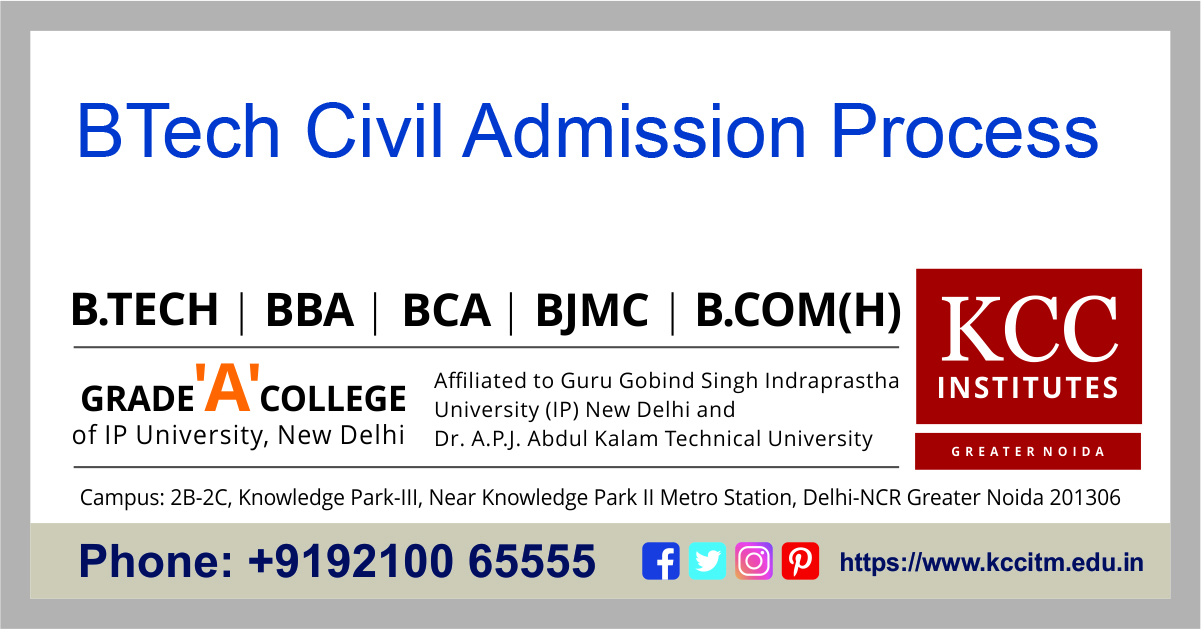BTech Civil Course Highlights
BTech in Civil Engineering is a four-year undergraduate degree course that deals with designing, planning, constructing, maintaining, improving, and supervising civil structures such as bridges, roads, dams, or anything of use to the civilian population. . Especially in the current economy like India, the need for skilled civil engineers is high in order to design and build infrastructure projects. This course also opens up the door for abroad jobs, especially in developing nations.
Fields in Civil engineering:
Civil Engineers/CE Technicians – are responsible for designing, planning, construction, supervision, maintenance, etc. of infrastructure projects.
Transportation Engineer – deals with the design, building, and maintenance of transportation systems.
Water Resource Engineer – manages and designs new systems for water resources.
Structural Engineers – are responsible for creating structures that can withstand any stress due to human use or environmental damage.
Environmental Engineers – have to manage projects for environmental safety and protection like air pollution control systems, water reclamation systems.
BTech Civil Engineering Eligibility
The eligibility criteria for BTech Civil Engineering are as follows. However, the eligibility criteria could differ from college to college.
- Candidates must have passed their 10+2 examinations with physics, chemistry, and mathematics.
- The aggregate score in 10+2 should be at least 50% and above.
- Candidates who have a diploma in allied sciences, done after class 10th, are also eligible for admission.
- The admissions are done through an entrance examination merit basis followed by counselling sessions conducted by universities.
Job avenues
Aspirants can get hired in public and private companies for different job roles like civil engineers, transportation engineers, water resource engineers, structural engineers, environmental engineers, civil engineering technicians, etc in which you are interested and want to make your career further.
They usually get employment in areas like construction and structures, environmental construction, irrigation, urban development, land development, or anything that is used by civilians.
The average placement package could be somewhere between INR 3,00,000 to 5,00,000. However, in developing countries, there is a huge demand for civil engineers in different fields in order to upgrade the infrastructure as per the technology so the salary could be sky high in those countries.
Why Study BTech Civil Engineering?
- Reputed profession: Civil engineering is a dominated field in developing nations where graduates can find job easily. It is one of the oldest and most reputable division of engineering.
- High pay: Average packages for Civil Engineering fresher could be somewhere between 3lpa to 6lpa depending upon the knowledge you have. However, the range could surpass 15lpa in case hired abroad.
- Career opportunities: A civil engineer can pursue a diverse array of career opportunities.
BTech Civil Course Fee
In developing nations, Civil engineering is one of the most popular courses widely accepted across the globe that can help students to explore the maximum career options with stable and high earnings, especially in the economically-growing countries. A civil engineer is required to design and plan the development of infrastructural entities such as roads, buildings, dams, canals, etc.
Usually, the fee structure of every college is slightly different confide to its management, Infrastructure, affiliation, ranking, specialization, etc. By and large, private institutions charge an incredibly huge amount for admissions for B.tech in Civil Engineering in comparison to public colleges owing to compromising over eligibility criteria and entrance tests. In government-recognized colleges, the candidate has to meet certain criteria to take admission.
A candidate needs to acquire a promising ranking in the entrance exam along with passed in 10+2 with an average of 50% minimum in Physics, Chemistry, Mathematics. On the other side, private colleges and institutes rely on direct admission on the basis of merit which certainly increases the fee structure. Nonetheless, it is imperative to consider public college first owing to its value and recognition.
Fees Structure:
The Average fees for B.Tech in Civil Engineering are between INR 100000 to INR 200000 per year in the duration of a four-year program that could vary from college to college.
This fees structure inculcates the following:
- Tuition Fees
- Book Bank Fees
- Medical Insurance
- Personality development classes
- Examination Fees
The inclusions could vary due to different factors depending upon the college/University a candidate chooses.
Does the college provide any discount on its fee structure?
Some colleges/universities offer scholarships considering different aspects like 10+2 marks, entrance ranking, inter /state/national–level sports participation, category, and other factors which significantly reduce the amount of the fee. However, some colleges also expect enormous donations in order to take admission in case of lower rank or marks which increases the amount of the fees.
BTech Civil Admission Process
Admission Process
The Civil Engineering admissions have been done through an entrance examination or direct admission through quota. The most popular engineering entrance exams are JEE Main and JEE Advanced in India, which are mandatory for admission by government-affiliated universities. Private institutes also conduct their own examinations like BITSAT, SRMJEE, etc for the admission process. However, in general, the guide to applying for an entrance exam based admission are as follows:
- Registration: Registration dates are announced by the university/Institute on their official website. An account needs to be created with basic mandatory details like email-id, phone number, etc to sign up for registration
- Fill up details: Fill up the application form with all requisite details. All the details should be accurate and correct.
- Submit documents: Scan and upload all the necessary documents. Please make sure documents need to be uploaded in a specific format only, as specified in the application portal.
- Application fee: A minimal application fee has to be paid by the student online during the submission of the application form.
- Download admit card: Admit cards have been released once eligibility is verified by the university. It must be downloaded and printed out as it is required on the day of the examination.
- Examination: Prepare for the entrance exam as per the syllabus and past papers given on the official website. Appear for the examination on the date announced.
- Results: Results are announced after a couple of weeks of the examination. A candidate can move on to the next round after qualifying for the exam.
- Counseling and admission: Counselling sessions have been declared for the qualifying students.A college has been allotted on a merit basis and after confirming his seat he needs to deposit fees to the college.
Some private engineering institutions also offer direct admission by their management quota seats provided to students who fulfill the minimum eligibility criteria laid down by them along with donations.
Eligibility Criteria B.Tech Civil Engineering
B.Tech – Civil Engineering Eligibility Criteria
The aspirants have to fulfill all the eligibility criteria mentioned below to pursue B.Tech in Civil Engineering from a recognized college –
Academics:
- Students must have completed their class 10+2 in Science stream from a recognized Board
- Applicants must have core subjects like Physics, Chemistry and Mathematics in order to get the admission
- Students should have secured a minimum aggregate of 45%-60% in the above subjects at the qualifying level and at least passing marks in the remaining subjects. Please note that the minimum average could vary from college to college and basis on the category a candidate has.
- Students with a diploma degree in the relevant discipline after their class 10/10+2 studies can directly opt for second-year B.Tech civil engineering program lateral entry.
Entrance test:
The most important factor is to clear the entrance exam for engineering. Colleges offer admission to the candidates based on their respective entrance exam scores like JEE Main, WBJEE, BITSAT, MHT CET, etc and it’s cut off. It is imperative to elucidate that this exam provides you a ranking and based on that, colleges have been allotted to the students during the counseling. However, some college offers management quota seats which don’t require the entrance but require donations.
Why Study BTech Civil Engineering?
Every candidate wanted to opt for BTech Civil Engineering has its own reasons and interests but the general overview says,
- Reputed profession,
- High pay,
- Career opportunities, are the prime factors.
B.Tech Civil Engineering Top Colleges
Indian Institute of Technology
IIT is considered to be a hub of intellectual minds where the best of the country study engineering. Precisely, there are 16 IITs in India and maintain a repo of the best Institutions for engineering education and research in terms of quality of education.
National Institutes of Technology
NIT is also considered one of the demanding engineering colleges in the country offering engineering courses both at graduate and undergraduate levels. At present, there are 31 NITs located in India. Some of the top-ranking NITs are- NIT Trichy, NIT Rourkela, NIT Warangal, VNIT Nagpur.
Delhi Technological University
DTU strives for excellence in emerging areas of science, engineering, technology, management, and allied areas. DTU is an impeccable and decent name among others for civil engineering courses.
KCC Institute of Technology and Management
KCCITM affiliated with AKTU and approved by AICTE considered as one of the best engineering colleges. Along with the latest infrastructure and innovative teaching techniques, the college primarily focuses on specializations in each branch in engineering. Having said that, in CE they offer specialization in Structural engineering and project management along with the seven free certification courses related to the curriculum.
These are a few colleges/university that has been achieving a high score to teach and place their students efficiently.
B.Tech Civil Engineering Course Comparison
BTech Civil Engineering is a four year engineering undergraduate course that deals with designing, planning, constructing, maintaining, improving and supervising civil structures such as bridges, roads, dams or anything of use to the civilian population.
| Specializations | Structural Engineering | Transportation Engineering
|
Construction Engineer
|
| Overview | Structural Engineering is responsible for creating stable and environmentally safe structures while keeping in mind the rigidity, strength, etc. of the structure.
|
Transportation engineering is planning, design, operation, and maintenance of safe and efficient transportation systems. | Construction Engineering designs, manages, and overlooks projects in the construction industry. |
| Focus Area | practical applications | Focus is on conception, planning, design, and operation, etc | Focus is also on practical applications along with theoretical knowledge |
| Average Course Fees | INR 1,50,000 | INR 2,00,000 | Rs. 3,00,000 |
| Areas of Employment | Building construction, pipelines and bridge construction, etc. | These systems include roadways, railways, waterways, airways, ports, harbours, and intermodal operations. | sewage systems, railways, Irrigation companies, construction, and land development, urban development, etc. |
| Job Avenues | Planning Engineer, Assistant Engineer, Structural Engineer, Project Engineer, Site Engineer, etc | Transportation Engineer, , Civil Engineering Technicians, Traffic Engineer | Civil Engineer, Water Resource Engineer, Environmental Engineers, Civil Engineering Technicians, etc |
| Average Placement Package | INR 3,30,000 | Rs 450000 | Rs. 3,00,000 to INR 5,00,000 |
Which Specialization is, currently, best in the market?
Although, the admission and eligibility criteria are same for all the fields of Civil Engineering and all the specializations are inter-related to each other in regard to understanding of the civil as a whole subject. However, one can either opt for Civil engineering covering all the part of specialities or directly go for specialization he/she is passionate about. Considering all things, in the present era, with the on-going transformation in the infrastructure and transportation system, these all are in trend and consider as a highly paid career.
B.Tech Civil Engineering Future Scope
Civil Engineering is one of the oldest branches of engineering across the globe. Candidates seek B.Tech in civil engineering as the course offers manifold opportunities in the government sector as well. A civil engineer is responsible to design and plan the development of infrastructural entities such as roads, buildings, dams, canals, etc.
Civil Engineers are in demand especially in developing countries like India, UAE and South Africa that offer good salary packages to fresher graduates as well. There are various government as well as private projects initiating every year in order to create an urban life facility in a society.
What could be the future scope after B.Tech in CE?
After B.tech in CE, one can either go for higher studies or consider the job prospects.
In Higher studies, these are the following options :
- M.Tech Soil & water Engineering
- Civil Engineering
- M.Tech Civil & Rural Engineering
- Technology
- Management
- MBA
In Job prospects, below are the following options :
- Civil Engineers
- Water Resource Engineers
- Structural Engineers
- Environmental Engineers
- Transportation Engineers
- Structure Analyst
- Structure Designer
- CAD Designer
- Construction Engineer
- Civil Engineer
- Construction Manager
- Infrastructural Consultant
- Civil & Building Contractors
They usually get employment in areas like construction and structures, Quality control department, environmental construction, irrigation, urban development, land development, and so forth. Candidates can also apply for government opportunities provided they have to appear for Indian Engineering Services (IES) exam conducted by Indian Government.
The average placement package that can go upto 6LPA by fresh graduates and for experienced, it could reached 20 LPA and more also.
These are the most common examples of job avenues in the area of Civil Engineering. As everything becoming urbanise, companies need more talented people that deals with designing, planning, constructing, maintaining, improving and supervising civil structures such as bridges, roads, dams or anything of use to the civilian population.
As India is a developing nation, it has a wide CE scope. There is no doubt everything is changing with each passing day. The technology has changed our lives so updating the methods of travelling, housing, and living adds up the number of opportunities for Civil Engineers.



